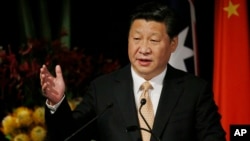China’s anti-corruption crackdown, led by President Xi Jinping, continues to reach into the upper ranks of China’s state-owned enterprises, politics and the military.
PetroChina Vice Chairman Liao Yongyuan has become the latest top Beijing official to become ensnared in the ongoing corruption purge.
State media has announced that Liao, who has been with PetroChina’s parent company, China National Petroleum Corporation (CNPC), for about 30 years, is being investigated by the Central Committee for Discipline Inspection (CCDI).
That body, part of the Communist Party of China, has been the tip of the spear for President Xi’s campaign to root out the corrupt.
Additionally, the CCDI announced this month that it is investigating the chairman of state-owned automaker China FAW Group, Xu Jianyi, for “serious discipline violations,” the phrase commonly used by the CCDI for corruption. The 61-year-old Xu also holds a high position in the Communist Party.
Tough stance
The investigations come on the heels of a session of the National People’s Congress in Beijing, where officials and delegates heard that fighting corruption in government, state enterprises and the military is a top priority.
“Our tough stance on corruption is here to stay,” Premier LI Keqiang told Congress. “Our tolerance for corruption is zero, and anyone guilty of corruption will be dealt with seriously. ... We will intensify government supervision, make full use of auditing oversight, and strictly monitor public funds, public resources and state-owned assets.”
Li’s remarks build upon an announcement in early February by the Communist Party that the CCDI is looking into “collusion between business figures and officials -- and corruption -- in state-owned enterprises.
That statement listed some of the investigation targets as including China State Shipbuilding Corporation, China Unicom, China Huadian Corporation, Dongfeng Motor Corporation, energy giant Shenhua Group and state petroleum concern Sinopec.
The CCDI said certain officials at China Unicom "collude with contractors or suppliers, using their power to seek money or sex." In the Shenhua Group, top officials there are suspected of manipulating the coal market to fatten their wallets.
Additional politicians charged
Alongside the CCDI’s probe into politicians and enterprises, the People’s Liberation Army (PLA) released a list of 14 generals who have already been convicted or have been under investigation for corruption.
The announcement said those officers are from military commands, including Chengdu, Shenyang, Shanxi, Hubel and Guagnzhou. It also said the probe extends into “members of the navy, air force, second artillery corps, the PLA General Staff Headquarters, the National Defense University and the Academy of Military Sciences.”
“This purge seems to have reached into all four departments under the CMC (Central Military Commission), and into the military regions,” said China analyst Alex Neill at the International Institute for Strategic Studies’ Singapore office.
Meanwhile, the PLA “has overhauled military houses, construction contracts, and accounting work, as well as enacted rules on official promotions as part of its drive” to project an image of cleanup and correction, according to Xinhua.
The anti-corruption drive has also snared foreign corporations doing business in China.
“Foreign companies have not been exempt from the war on graft: Daimler, Qualcomm and Microsoft are among the multinationals that have come under investigation in recent months,” analyst Henri-Claude de Bettignies said in the March 5 FCPA Blog.
In September 2014, British firm GlaxoSmithKline was fined $489 million for allegedly bribing doctors.
More purges planned
The corruption probes are likely to widen, analysts say.
“The next big scheduled purge to take place will be the People’s Armed Police (PAP) in a month or so -- this is likely to expose another widespread network of corruption in the paramilitary forces,” analyst Neil said “It is widely believed that corruption is endemic within the PAP.”
Many China watchers see President Xi’s corruption crackdown as an effort to maintain his legitimacy in office, and by extension, the continued legitimacy of the party to hold absolute power.
“We can assume,” analyst de Bettignies told the FCPA Blog, “that Beijing wants very much to avoid a homegrown version of the umbrella revolution in Hong Kong, Occupy Wall Street, the Arab Spring and other watershed events in the current global struggle for emancipation illustrated in the ‘Freedom Rising’ trend.”
While many China analysts said that Xi’s anti-corruption purge focused primarily on political rivals, Raffaelo Pantucci at the London-based Royal United Services Institute said the purge has broadened beyond them.
“As the anti-corruption campaign continues on and moves into increasingly sensitive parts of the system, like the intelligence apparatus and the PLA, it becomes increasingly hard to simply dismiss it as a political purge to eliminate enemies,” Pantucci told VOA via e-mail.
“The bigger question is now how long is it going to go on for and what is the damage it might be doing to decision-making within the system and even further ahead, what this might mean for any possible backlash within the system against the leadership,” he said.
But analyst Neil said Xi’s grip on Beijing’s reins appears to be increasing.
“The emphasis on purging the national security infrastructure may be an indication that Xi Jinping is amassing more power in the Central National Security Commission (CNSC) he established at the third plenum in 2013,” he said.





